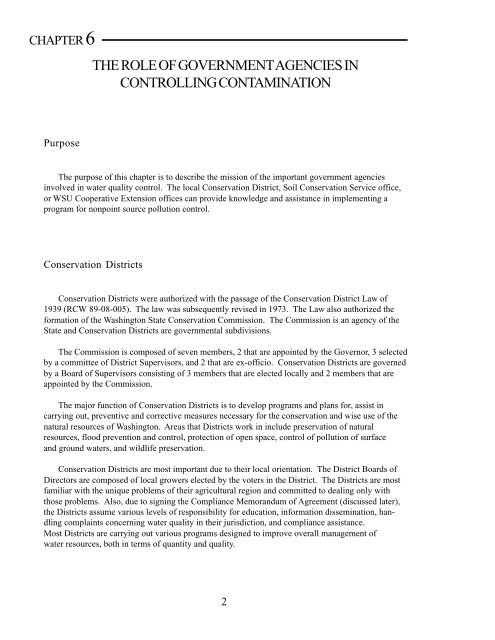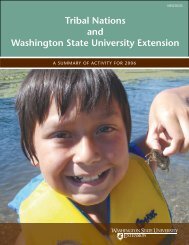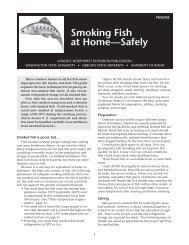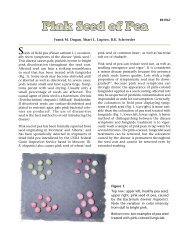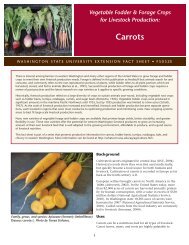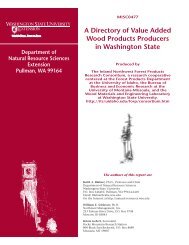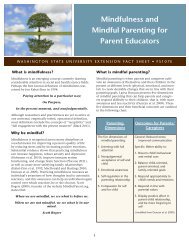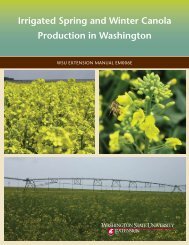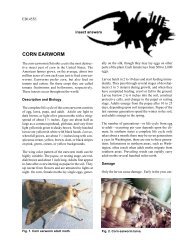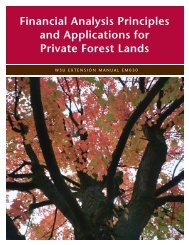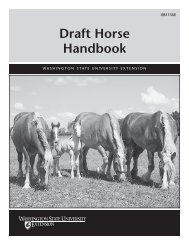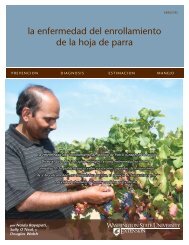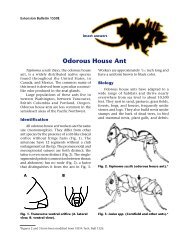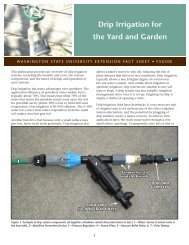Em4885 irrigation management practices to protect ground water
Em4885 irrigation management practices to protect ground water
Em4885 irrigation management practices to protect ground water
Create successful ePaper yourself
Turn your PDF publications into a flip-book with our unique Google optimized e-Paper software.
CHAPTER 6<br />
Purpose<br />
THE ROLE OF GOVERNMENT AGENCIES IN<br />
CONTROLLING CONTAMINATION<br />
The purpose of this chapter is <strong>to</strong> describe the mission of the important government agencies<br />
involved in <strong>water</strong> quality control. The local Conservation District, Soil Conservation Service office,<br />
or WSU Cooperative Extension offices can provide knowledge and assistance in implementing a<br />
program for nonpoint source pollution control.<br />
Conservation Districts<br />
Conservation Districts were authorized with the passage of the Conservation District Law of<br />
1939 (RCW 89-08-005). The law was subsequently revised in 1973. The Law also authorized the<br />
formation of the Washing<strong>to</strong>n State Conservation Commission. The Commission is an agency of the<br />
State and Conservation Districts are governmental subdivisions.<br />
The Commission is composed of seven members, 2 that are appointed by the Governor, 3 selected<br />
by a committee of District Supervisors, and 2 that are ex-officio. Conservation Districts are governed<br />
by a Board of Supervisors consisting of 3 members that are elected locally and 2 members that are<br />
appointed by the Commission.<br />
The major function of Conservation Districts is <strong>to</strong> develop programs and plans for, assist in<br />
carrying out, preventive and corrective measures necessary for the conservation and wise use of the<br />
natural resources of Washing<strong>to</strong>n. Areas that Districts work in include preservation of natural<br />
resources, flood prevention and control, <strong>protect</strong>ion of open space, control of pollution of surface<br />
and <strong>ground</strong> <strong>water</strong>s, and wildlife preservation.<br />
Conservation Districts are most important due <strong>to</strong> their local orientation. The District Boards of<br />
Direc<strong>to</strong>rs are composed of local growers elected by the voters in the District. The Districts are most<br />
familiar with the unique problems of their agricultural region and committed <strong>to</strong> dealing only with<br />
those problems. Also, due <strong>to</strong> signing the Compliance Memorandum of Agreement (discussed later),<br />
the Districts assume various levels of responsibility for education, information dissemination, handling<br />
complaints concerning <strong>water</strong> quality in their jurisdiction, and compliance assistance.<br />
Most Districts are carrying out various programs designed <strong>to</strong> improve overall <strong>management</strong> of<br />
<strong>water</strong> resources, both in terms of quantity and quality.<br />
2


